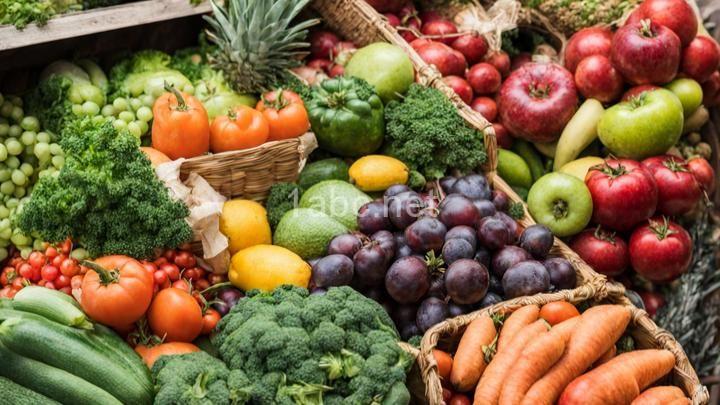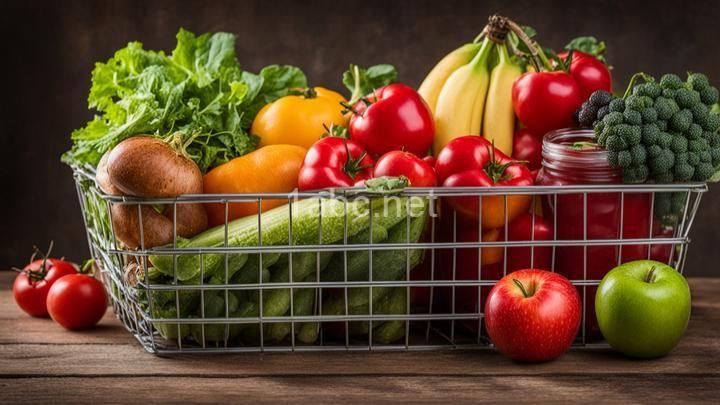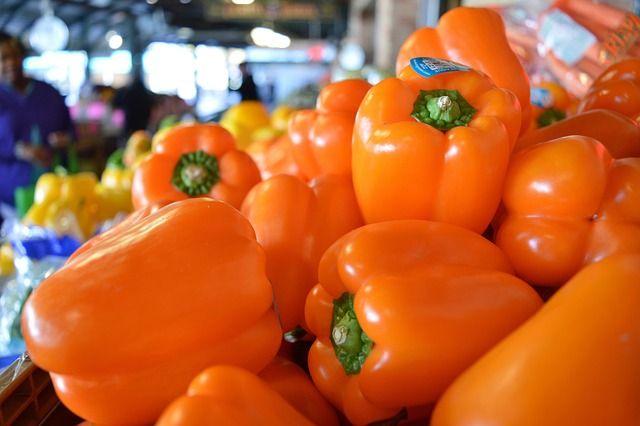The Benefits of Eating Seasonal Produce and How to Shop for It
Introduction:
I. Health Benefits of Eating Seasonal Produce:
II. Environmental Benefits of Eating Seasonal Produce:
III. Cost Benefits of Eating Seasonal Produce:
IV. How to Shop for Seasonal Produce:
1. Researching What's in Season:
2. Visiting Farmer's Markets:
3. Reading Labels at Grocery Stores:
4. Choosing Ripe and Fresh Produce:
5. Storing and Preserving Your Seasonal Bounty:
Conclusion:

Introduction:
Welcome to our friendly guide on the benefits of eating seasonal produce! In today's fast-paced world, it's easy to overlook the importance of eating in harmony with nature. But by incorporating seasonal fruits and vegetables into your diet, you not only support your health but also contribute positively to the environment and local economy. In this blog post, we will explore the numerous advantages of eating seasonal produce and provide you with helpful tips on how to shop for it.
I. Health Benefits of Eating Seasonal Produce:
Eating seasonal produce is not only a delicious way to enjoy fresh and flavorful fruits and vegetables, but it also offers a range of health benefits. When produce is in season, it is picked at its peak ripeness, which means it contains higher vitamin and mineral content compared to out-of-season produce. By consuming seasonal fruits and vegetables, you are ensuring that you are getting the maximum nutritional advantage from your food.
II. Environmental Benefits of Eating Seasonal Produce:
One of the biggest advantages of eating seasonal produce is its positive impact on the environment. When we opt for seasonal fruits and vegetables, we reduce the carbon footprint associated with the transportation of out-of-season produce. By choosing locally grown seasonal produce, we also support local farmers and the economy, as well as contribute to the preservation of farmland and biodiversity.
III. Cost Benefits of Eating Seasonal Produce:
Eating seasonal produce can also be budget-friendly. When fruits and vegetables are in season, they are abundant, which often leads to lower prices. On the other hand, out-of-season produce needs to be transported from far distances, which increases its cost. By shopping for seasonal produce, you can save money while still enjoying a variety of fresh and nutritious options.
IV. How to Shop for Seasonal Produce:
Now that we understand the benefits of eating seasonal produce, let's explore some tips on how to shop for it.
1. Researching What's in Season:
It is essential to stay informed about what fruits and vegetables are currently in season. Online resources, apps, or local farmer's markets can be valuable sources for this information. By knowing what's in season, you can plan your meals accordingly and make informed choices when shopping.
2. Visiting Farmer's Markets:
Visiting farmer's markets is a delightful way to shop for seasonal produce. These markets offer a vibrant atmosphere and a community feel. The produce is often fresher since it is sourced directly from local farms. Additionally, you have the opportunity to interact with farmers, ask questions, and learn more about where your food comes from. By supporting local businesses, you contribute to the sustainability of your community.
3. Reading Labels at Grocery Stores:
When shopping for seasonal produce at grocery stores, it is important to read labels and identify where the produce comes from. Look for labels such as "locally sourced," "organic," or "imported." Locally sourced produce is more likely to be in season and support local farmers.
4. Choosing Ripe and Fresh Produce:
To make the most of your seasonal shopping experience, it is crucial to know how to choose ripe and fresh produce. Look for visual cues such as vibrant colors, firmness, and a fresh smell. Different fruits and vegetables have specific characteristics that indicate ripeness, so familiarize yourself with these cues to ensure you select the best quality produce.
5. Storing and Preserving Your Seasonal Bounty:
After you have brought your seasonal produce home, it's important to store it properly to maintain its freshness. Different fruits and vegetables have different storage requirements, so it's essential to research and follow the appropriate storage techniques. If you find yourself with an excess of seasonal produce, consider preserving it through freezing, canning, or pickling. These techniques allow you to enjoy the flavors of the season even after it has passed.
Conclusion:
In conclusion, there are numerous benefits to incorporating seasonal fruits and vegetables into your diet. By doing so, you support your health, reduce your carbon footprint, save money, and contribute to the local economy. So, the next time you go grocery shopping, remember to research what's in season, visit farmer's markets, read labels, choose ripe produce, and properly store and preserve your seasonal bounty. Embrace the flavors and advantages of eating in harmony with nature by choosing seasonal fruits and vegetables. Happy shopping!
Remember, by incorporating seasonal produce into your diet, you not only support your health but also contribute positively to the environment and local economy. So next time you go grocery shopping, keep these tips in mind and enjoy all the benefits that come with eating fresh, seasonal produce!
FREQUENTLY ASKED QUESTIONS
What does it mean to eat seasonal produce?
Eating seasonal produce means consuming fruits and vegetables that are naturally grown and harvested during specific times of the year. This means enjoying foods that are at their peak freshness and flavor. Seasonal produce is typically grown locally, minimizing the need for long-distance transportation and preserving the nutritional value of the produce.When you choose to eat seasonal produce, you are not only supporting local farmers and businesses but also reducing your carbon footprint. By opting for fruits and vegetables that are in season, you are reducing the energy required for storage and transportation, as well as the need for artificial preservation methods.
Seasonal produce is also more likely to be affordable and accessible. When crops are abundant, their prices tend to be lower, making it easier for individuals and families to incorporate a variety of fresh and healthy foods into their diets.
In addition to the environmental and economic benefits, eating seasonal produce can be a delightful culinary experience. It allows you to enjoy a wide range of flavors and textures throughout the year, as each season brings its own unique offerings. From the crisp freshness of spring greens to the juicy sweetness of summer berries and the hearty root vegetables of fall, seasonal produce adds diversity and excitement to your meals.
To make the most of seasonal produce, it's helpful to stay informed about what fruits and vegetables are currently in season in your region. Local farmers' markets, community-supported agriculture (CSA) programs, and online resources can provide valuable information about what produce is available during different times of the year.
By embracing the concept of eating seasonal produce, you can enjoy the benefits of fresh, flavorful, and sustainable foods while supporting local farmers and enjoying a varied and exciting culinary journey throughout the year.
Why should I eat seasonal produce?
Eating seasonal produce offers numerous benefits for both your health and the environment. Here are a few reasons why you should consider incorporating more seasonal fruits and vegetables into your diet:
-
Nutritional Value: Seasonal produce is harvested at its peak ripeness, which means it is packed with essential vitamins, minerals, and antioxidants. These nutrients are vital for maintaining a healthy immune system and overall well-being.
-
Better Taste: When fruits and vegetables are in season, they tend to be more flavorful and delicious. This is because they are allowed to fully develop their natural sugars and flavors. Eating seasonal produce can be a delightful culinary experience that enhances your meals.
-
Cost-Effectiveness: Seasonal produce is often more affordable compared to out-of-season options. When fruits and vegetables are abundant, their prices tend to drop due to increased supply. By choosing seasonal options, you can enjoy nutrient-rich foods while saving some money.
-
Environmental Sustainability: Choosing seasonal produce supports sustainable agriculture practices. Locally grown seasonal produce requires less transportation, reducing carbon emissions associated with long-distance shipping. Additionally, seasonal crops are often grown using fewer pesticides, which benefits both the environment and your health.
-
Support Local Farmers: Opting for seasonal produce allows you to support local farmers and contribute to your community's economy. Buying directly from farmers' markets or joining a community-supported agriculture (CSA) program helps create a stronger connection between consumers and growers.
Remember, eating seasonally doesn't mean you have to completely avoid out-of-season produce. It simply encourages you to prioritize and enjoy the bounty of each season while reaping the benefits of fresh, flavorful, and nutritious foods.
What are the benefits of eating seasonal produce?
Eating seasonal produce offers numerous benefits for both our health and the environment. Firstly, seasonal fruits and vegetables are harvested at their peak ripeness, meaning they are packed with flavor and nutrients. This ensures that we are getting the freshest and most nutritious produce possible.Additionally, seasonal produce tends to be more affordable than out-of-season options. Since there is an abundance of fruits and vegetables during their peak seasons, the prices are typically lower. This makes it easier for us to incorporate a variety of healthy foods into our diets without breaking the bank.
By choosing seasonal produce, we also support local farmers and reduce our carbon footprint. When we buy produce that is in-season, it is more likely to be sourced locally, meaning it has traveled a shorter distance to reach our plates. This reduces the amount of transportation required, resulting in lower greenhouse gas emissions and a smaller impact on the environment.
Furthermore, eating seasonal produce allows us to enjoy a diverse range of flavors throughout the year. Each season brings its own unique fruits and vegetables, offering a variety of tastes and textures. This encourages us to explore new recipes and experiment with different ingredients, making our meals more exciting and enjoyable.
In conclusion, the benefits of eating seasonal produce are plentiful. From improved taste and nutrition to supporting local farmers and reducing our carbon footprint, choosing seasonal fruits and vegetables is a win-win for both our health and the environment. So next time you're grocery shopping, consider reaching for those in-season goodies!
How can eating seasonal produce benefit my health?
Eating seasonal produce can have numerous benefits for your health. First and foremost, seasonal fruits and vegetables are often picked at the peak of their freshness, which means they are packed with essential nutrients. These nutrients, such as vitamins, minerals, and antioxidants, are crucial for maintaining a healthy immune system, boosting energy levels, and supporting overall well-being.Moreover, seasonal produce is typically grown locally, which means it spends less time in transit and is therefore likely to be fresher. Fresher produce not only tastes better but also retains higher levels of nutrients compared to produce that has been transported long distances.
Another advantage of eating seasonal produce is that it encourages a varied and diverse diet. Each season brings a different array of fruits and vegetables, which allows you to explore new flavors and textures. By incorporating a wide range of seasonal produce into your meals, you can ensure that you are getting a rich and balanced mix of nutrients.
Furthermore, eating seasonal produce can support sustainability and environmental consciousness. Locally grown produce requires fewer resources for transportation and storage, reducing the carbon footprint associated with food production. Additionally, by supporting local farmers and markets, you contribute to the preservation of agricultural traditions and the local economy.
In summary, eating seasonal produce provides a multitude of health benefits, including increased nutrient intake, enhanced flavor, and support for sustainable practices. So, next time you're at the grocery store or farmer's market, opt for the fruits and vegetables that are in season to maximize your health and enjoyment of fresh, nutritious food.




